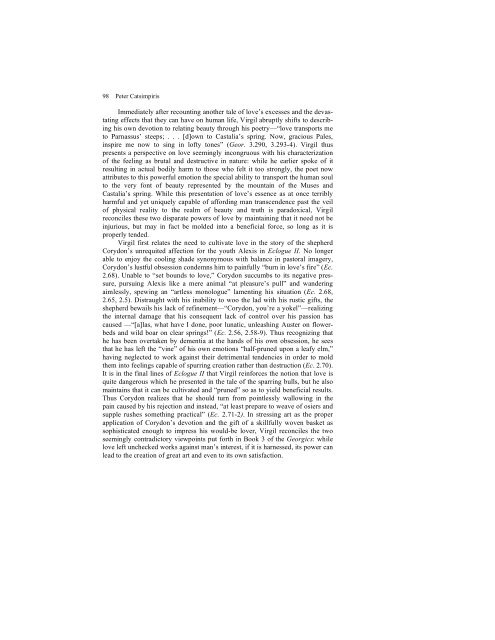Create successful ePaper yourself
Turn your PDF publications into a flip-book with our unique Google optimized e-Paper software.
98 Peter Catsimpiris<br />
Immediately after recounting another tale of love’s excesses and the devastating<br />
effects that they can have on human life, Virgil abruptly shifts to describing<br />
his own devotion to relating beauty through his poetry—“love transports me<br />
to Parnassus’ steeps; . . . [d]own to Castalia’s spring. Now, gracious Pales,<br />
inspire me now to sing in lofty tones” (Geor. 3.290, 3.293-4). Virgil thus<br />
presents a perspective on love seemingly incongruous with his characterization<br />
of the feeling as brutal and destructive in nature: while he earlier spoke of it<br />
resulting in actual bodily harm to those who felt it too strongly, the poet now<br />
attributes to this powerful emotion the special ability to transport the human soul<br />
to the very font of beauty represented by the mountain of the Muses and<br />
Castalia’s spring. While this presentation of love’s essence as at once terribly<br />
harmful and yet uniquely capable of affording man transcendence past the veil<br />
of physical reality to the realm of beauty and truth is paradoxical, Virgil<br />
reconciles these two disparate powers of love by maintaining that it need not be<br />
injurious, but may in fact be molded into a beneficial force, so long as it is<br />
properly tended.<br />
Virgil first relates the need to cultivate love in the story of the shepherd<br />
Corydon’s unrequited affection for the youth Alexis in Eclogue II. No longer<br />
able to enjoy the cooling shade synonymous with balance in pastoral imagery,<br />
Corydon’s lustful obsession condemns him to painfully “burn in love’s fire” (Ec.<br />
2.68). Unable to “set bounds to love,” Corydon succumbs to its negative pressure,<br />
pursuing Alexis like a mere animal “at pleasure’s pull” and wandering<br />
aimlessly, spewing an “artless monologue” lamenting his situation (Ec. 2.68,<br />
2.65, 2.5). Distraught with his inability to woo the lad with his rustic gifts, the<br />
shepherd bewails his lack of refinement—“Corydon, you’re a yokel”—realizing<br />
the internal damage that his consequent lack of control over his passion has<br />
caused —“[a]las, what have I done, poor lunatic, unleashing Auster on flowerbeds<br />
and wild boar on clear springs!” (Ec. 2.56, 2.58-9). Thus recognizing that<br />
he has been overtaken by dementia at the hands of his own obsession, he sees<br />
that he has left the “vine” of his own emotions “half-pruned upon a leafy elm,”<br />
having neglected to work against their detrimental tendencies in order to mold<br />
them into feelings capable of spurring creation rather than destruction (Ec. 2.70).<br />
It is in the final lines of Eclogue II that Virgil reinforces the notion that love is<br />
quite dangerous which he presented in the tale of the sparring bulls, but he also<br />
maintains that it can be cultivated and “pruned” so as to yield beneficial results.<br />
Thus Corydon realizes that he should turn from pointlessly wallowing in the<br />
pain caused by his rejection and instead, “at least prepare to weave of osiers and<br />
supple rushes something practical” (Ec. 2.71-2). In stressing art as the proper<br />
application of Corydon’s devotion and the gift of a skillfully woven basket as<br />
sophisticated enough to impress his would-be lover, Virgil reconciles the two<br />
seemingly contradictory viewpoints put forth in Book 3 of the Georgics: while<br />
love left unchecked works against man’s interest, if it is harnessed, its power can<br />
lead to the creation of great art and even to its own satisfaction.

















